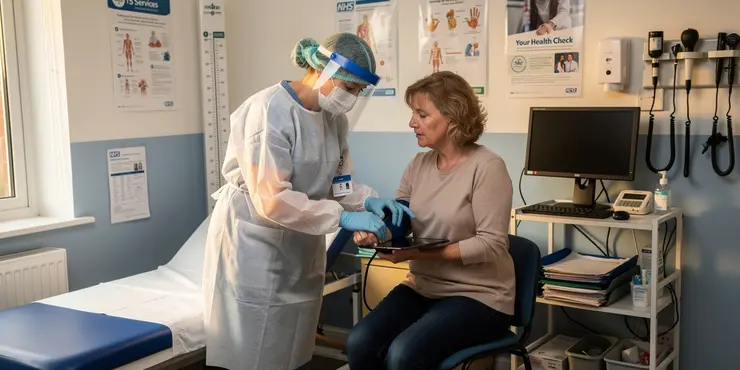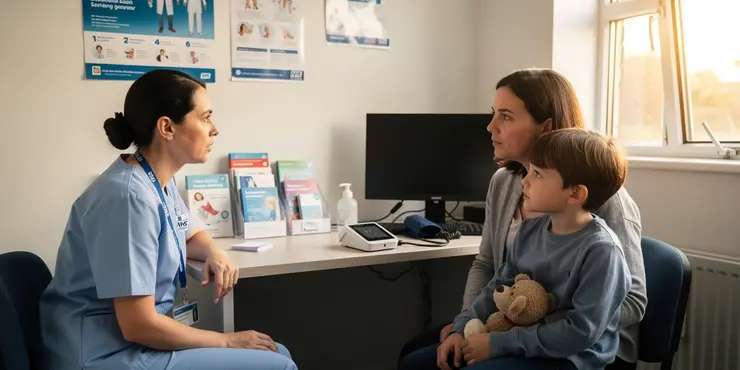
Find Help
More Items From Ergsy search
-

How is Nipah Virus controlled during outbreaks?
Relevance: 100%
-

Can Nipah Virus cause outbreaks?
Relevance: 88%
-

What regions are most at risk for Nipah Virus outbreaks?
Relevance: 79%
-

Why are Nipah Virus outbreaks considered a public health concern?
Relevance: 78%
-

What is Nipah Virus?
Relevance: 77%
-

Is there a cure for Nipah Virus?
Relevance: 73%
-

Where was Nipah Virus first identified?
Relevance: 72%
-

How is Nipah Virus transmitted?
Relevance: 69%
-

What global organizations are involved in Nipah Virus research?
Relevance: 69%
-

What is the mortality rate of Nipah Virus infection?
Relevance: 68%
-

How is Nipah Virus diagnosed?
Relevance: 68%
-

Can Nipah Virus be transmitted from person to person?
Relevance: 68%
-

Which animals are known to carry Nipah Virus?
Relevance: 66%
-

Can Nipah Virus cause neurological complications?
Relevance: 65%
-

What preventive measures can reduce the risk of Nipah Virus infection?
Relevance: 64%
-

What role do fruit bats play in Nipah Virus transmission?
Relevance: 63%
-

What measures are being taken to control Marburg virus outbreaks?
Relevance: 63%
-

Has a vaccine been developed against Nipah Virus?
Relevance: 63%
-

What are the symptoms of Nipah Virus infection?
Relevance: 61%
-

What should someone do if they suspect Nipah Virus infection?
Relevance: 60%
-

How do health authorities confirm a Marburg virus outbreak?
Relevance: 49%
-

Has Marburg virus caused any major outbreaks?
Relevance: 47%
-

Are there any countries at higher risk for Marburg virus outbreaks?
Relevance: 47%
-

What is the Marburg Virus?
Relevance: 40%
-

Is the Marburg virus related to the Ebola virus?
Relevance: 39%
-

What is the Ebola virus?
Relevance: 38%
-

Are there any Zika virus outbreaks currently?
Relevance: 37%
-

Where was the Marburg virus first discovered?
Relevance: 35%
-

What research is being done on the Marburg virus?
Relevance: 35%
-

Are measles outbreaks common in the UK?
Relevance: 34%
-

Where do Chikungunya outbreaks typically occur?
Relevance: 34%
-

How is the Marburg virus transmitted?
Relevance: 34%
-

What is the mortality rate of Marburg virus disease?
Relevance: 33%
-

Is there a vaccine for Marburg virus?
Relevance: 33%
-

Can mosquitoes carrying West Nile Virus be controlled?
Relevance: 33%
-

What triggers a cold sore outbreak?
Relevance: 33%
-

Is there a vaccine for West Nile Virus?
Relevance: 31%
-

Can Marburg virus disease be prevented?
Relevance: 31%
-

How can healthcare workers protect themselves from Marburg virus infection?
Relevance: 31%
-

Why are measles outbreaks still occurring?
Relevance: 31%
Introduction to Nipah Virus
Nipah virus (NiV) is a zoonotic virus that can cause severe disease in both animals and humans. The virus is transmitted through direct contact with infected animals, such as bats or pigs, or through contaminated food or directly from person-to-person. Outbreaks are mainly observed in South and Southeast Asia, affecting countries like Bangladesh, India, and Malaysia. The challenges in controlling Nipah virus outbreaks lie in its transmission potential and high fatality rate.
Early Detection and Surveillance
The first step in controlling Nipah virus outbreaks is early detection through surveillance systems. Health authorities need to be vigilant in monitoring cases of encephalitis and respiratory illness, particularly in regions where the virus is known to circulate. Laboratory testing of suspected cases is essential for accurate diagnosis. Establishing a strong surveillance network helps in quickly identifying and isolating new cases to prevent further spread.
Containment Measures
Once an outbreak is confirmed, containment measures are crucial to control the spread. Isolation of infected individuals and quarantine of those who have been in contact with them are standard procedures. In healthcare settings, strict infection control practices, including the use of personal protective equipment (PPE) and proper hand hygiene, are vital to prevent hospital-acquired infections. Public health authorities also focus on informing and educating communities about the importance of avoiding contact with infected individuals and animals.
Community Engagement
Engaging the community plays a significant role in controlling the spread of Nipah virus. Public health messages should be culturally sensitive and delivered through effective channels. By educating the public about transmission routes, symptoms, and preventive measures, communities can be better prepared to take appropriate actions during an outbreak. This includes promoting safe food practices and encouraging individuals to seek medical care early if symptoms appear.
Coordination with Agricultural Sectors
As Nipah virus is zoonotic, coordination with agricultural and animal health sectors is essential for controlling outbreaks. Surveillance of animal populations, particularly of bats and pigs, helps identify and manage potential sources of the virus. Farmers and those working with animals are educated on infection control practices to minimize the risk of zoonotic transmission. This integrated ‘One Health’ approach ensures comprehensive management of the outbreak.
Research and Vaccination Efforts
Continuing research is vital for understanding the Nipah virus and developing effective countermeasures, such as vaccines and treatments. Although there is currently no licensed vaccine for Nipah virus, several candidates are under development. Investment in research can enhance preparedness for future outbreaks and potentially provide long-term solutions for control and prevention. Collaborative international efforts are crucial in advancing these scientific goals.
Conclusion
Controlling Nipah virus outbreaks involves a multipronged approach that includes early detection, effective containment measures, community engagement, cooperation with animal health sectors, and robust research initiatives. By adopting a coordinated strategy, the impact of outbreaks can be minimized, protecting both human and animal populations from this deadly virus.
What is Nipah Virus?
Nipah virus, or NiV, is a germ that can make animals and people very sick. It can spread from animals like bats and pigs to people. It can also spread from one person to another. You can catch it by touching these animals, eating contaminated food, or being near someone who is sick. People in countries like Bangladesh, India, and Malaysia have had problems with it. The virus is hard to control because it spreads easily and makes people very sick.
Finding and Watching for Nipah Virus
The first thing to do to stop the virus is to find it early. Health workers look out for signs of sickness, like brain and breathing problems, especially in places where the virus is known. Testing people who might have the virus is important to know for sure if they have it. Having a strong system to watch for the virus helps stop it from spreading by quickly finding and helping sick people.
Stopping the Spread
When the virus appears, stopping it from spreading is very important. Sick people need to stay away from others, and people who had contact with them might need to stay home too. Doctors and nurses use gloves and masks to stay safe. They wash their hands a lot to stop the virus. Public health workers tell people how to stay safe and why avoiding sick animals and people is important.
Working with Communities
Telling people in the community about the virus helps stop it. Messages should be easy to understand and share. People learn how the virus spreads, what signs to look for, and how to stay safe. They are also told to be careful with food and to see a doctor if they feel sick. This helps everyone be ready to act if the virus comes to their area.
Working with Farmers
Nipah virus comes from animals, so working with farms is important. Checking animals like bats and pigs helps find the virus early. Farmers learn how to keep themselves safe when working with animals. This all-in-one approach—called 'One Health'—looks after both humans and animals to control the virus.
Research and Vaccines
Research is needed to learn more about Nipah virus and find ways to fight it, like creating vaccines. There is no approved vaccine yet, but scientists are working on it. Investing in research helps us get ready for future outbreaks. It can also give us long-term ways to stop the virus. Scientists from different countries work together to reach these goals.
Wrapping Up
To stop Nipah virus outbreaks, we need to do many things: find the virus early, stop it from spreading, work with communities and farmers, and support research. By working together, we can keep people and animals safe from this dangerous virus.
Frequently Asked Questions
What is the primary method for controlling Nipah virus outbreaks?
The primary method for controlling Nipah virus outbreaks is through isolation and quarantine of infected individuals to prevent further spread.
Can vaccines be used to control Nipah virus outbreaks?
As of now, there is no licensed vaccine available for Nipah virus, so outbreak control relies heavily on public health measures.
How important is early detection in controlling Nipah virus outbreaks?
Early detection is crucial for controlling Nipah virus outbreaks as it allows for the timely implementation of control measures to prevent widespread transmission.
What role do healthcare facilities play in controlling Nipah virus?
Healthcare facilities play a critical role by isolating patients, implementing strict infection control practices, and treating symptoms to prevent the spread of the virus.
How does contact tracing help in controlling Nipah outbreaks?
Contact tracing helps by identifying and monitoring people who have been in close contact with infected individuals to prevent further transmission.
Is quarantine effective in controlling Nipah virus outbreaks?
Yes, quarantine is effective as it helps prevent the spread of the virus from infected individuals to others.
What personal protective equipment (PPE) is recommended during a Nipah outbreak?
Healthcare workers and others at risk should use PPE such as gloves, masks, gowns, and eye protection to minimize the risk of infection.
How does public awareness contribute to controlling Nipah outbreaks?
Public awareness campaigns help inform communities about preventive measures, symptoms, and actions to take, thereby reducing transmission.
What are the guidelines for handling animals during a Nipah outbreak?
People should avoid contact with bats and sick animals, and practice good hygiene when handling livestock to prevent zoonotic transmission.
Why is it important to monitor wildlife during Nipah outbreaks?
Monitoring wildlife, particularly bat populations, helps identify potential sources of the virus and prevent spillover to humans.
How do travel restrictions help control Nipah virus spread?
Travel restrictions help control the spread of the virus by limiting the movement of potentially infected individuals to new areas.
What role does international cooperation play in controlling Nipah outbreaks?
International cooperation facilitates sharing of information, resources, and expertise, aiding in the global effort to control outbreaks.
Are there specific hygiene practices recommended during a Nipah outbreak?
Yes, regular handwashing, avoiding contact with sick individuals, and maintaining good personal hygiene are recommended to reduce the risk of infection.
How is food safety addressed during a Nipah outbreak?
Avoiding consumption of raw date palm sap and ensuring food is properly cooked can help reduce the risk of transmission through contaminated food.
What are the challenges in controlling Nipah virus outbreaks?
Challenges include lack of vaccines, limited treatment options, and difficulties in early detection and effective surveillance.
How critical is community engagement in controlling Nipah outbreaks?
Community engagement is critical as it ensures that local populations adhere to health advisories and control measures.
Why is research important in controlling Nipah virus?
Research is essential to improve understanding of the virus and develop better diagnostic tools, treatments, and vaccines.
How can technological tools assist in controlling Nipah outbreaks?
Technological tools can assist through improved surveillance, data collection, and analysis to track and respond to outbreaks efficiently.
What role do governments play in controlling Nipah virus outbreaks?
Governments are responsible for ensuring effective public health responses, setting protocols, and providing resources for outbreak control.
Is it possible to completely eradicate Nipah virus?
Complete eradication is challenging due to its presence in wildlife, but effective control measures can significantly reduce the incidence of outbreaks.
How can we stop the Nipah virus from spreading?
The best way to stop the Nipah virus from spreading is to keep people who are sick away from others. This means they should stay alone and not see other people until they are better.
Can vaccines help stop Nipah virus from spreading?
The Nipah virus is a disease that can make people very sick. We want to know if a vaccine can help stop it. A vaccine is like a shield that protects people from getting sick.
If people get the vaccine, it may help them stay healthy. This way, fewer people get the virus, and it doesn't spread as much.
If you have trouble reading, you can ask someone to read to you or use a reading tool to help.
There is no vaccine for the Nipah virus right now. This means there is no medicine to stop people from getting it. To keep safe, we need to follow health rules very carefully.
Why is it important to find Nipah virus early?
Finding the Nipah virus early is really important. It helps stop the virus from spreading to more people. This can keep more people safe and healthy.
Here are some ways to help find it early:
- Go to the doctor if you feel sick.
- Wash your hands often to stay clean.
- Listen to health workers and follow their advice.
It is really important to find Nipah virus early. This helps stop the virus from spreading to lots of people. When we find it early, we can do things to keep people safe.
How do hospitals help control Nipah virus?
Hospitals and clinics work hard to stop the spread of Nipah virus. They take care of people who are sick and help them get better. They also teach people how to stay safe and healthy. Doctors and nurses wear special clothes to stay safe and stop the virus from spreading. If you have questions, you can ask a nurse or doctor.
Hospitals and clinics are very important. They keep people who are sick away from others. They follow strict rules to stop germs from spreading. They also help people feel better.
How does looking at people who were near sick people help stop Nipah from spreading?
Contact tracing helps by finding people who have been near someone with an illness. It watches them to stop more people from getting sick.
Does staying away from others help stop the Nipah virus from spreading?
Yes, staying away from other people when you are sick helps stop the sickness from spreading. This is called quarantine.
What safety gear should you wear during a Nipah outbreak?
During a Nipah outbreak, wearing safety gear can help keep you safe. This safety gear is called Personal Protective Equipment or PPE.
Here's what you should wear:
- Gloves: Wear gloves to protect your hands.
- Masks: Put on a mask to cover your nose and mouth.
- Goggles or face shield: Use these to protect your eyes.
- Gowns or long-sleeved aprons: Wear these to cover your body.
These items help stop germs from getting on you. If you need help remembering what to wear, ask someone you trust. You can also use pictures or checklists to remind you.
People who work in healthcare and people who might get sick should wear special clothes to stay safe. They should wear gloves, masks, gowns, and eye protection. This helps keep them healthy.
How can telling people help stop Nipah outbreaks?
Awareness campaigns tell people in communities about how to stay safe, what signs to look for, and what to do. This helps stop the spread of disease.
What should you do with animals when Nipah is spreading?
Stay away from bats and sick animals. Wash your hands well when taking care of farm animals. This helps stop germs from spreading.
Why do we watch animals during Nipah outbreaks?
When Nipah virus makes people sick, it can also affect animals. Watching animals helps us see if they are sick too. If animals are sick, they might spread the virus. We want to keep everyone safe, so we need to know if animals have the virus.
Here are some things we can use to help:
- Pictures: Use pictures to show which animals are being checked.
- Videos: Watch videos about how Nipah virus affects animals.
- Talking: Talk with someone who can explain this in a simple way.
Watching wildlife, like bats, helps us find where viruses might come from. This can stop them from spreading to people.
How do travel rules help stop Nipah virus from spreading?
Travel rules help stop the virus from spreading. They do this by stopping sick people from going to new places.
How do countries work together to stop Nipah outbreaks?
Countries help each other to stop the spread of Nipah virus.
They share important information and research.
This helps doctors and scientists learn more about the virus.
They also share tools and medicine to fight the virus.
Use pictures or videos to understand better.
Talk to someone if you have questions.
Countries working together can help share important information and resources. This helps everyone fight against disease outbreaks all over the world.
What should you do to stay clean during a Nipah outbreak?
Here are some simple steps to help you:
- Wash your hands often with soap and water.
- Avoid touching your face, like your eyes, nose, and mouth.
- Stay away from people who are sick.
- Keep surfaces clean, like tables and doorknobs.
You can use pictures and videos to learn these steps better.
Yes, you should wash your hands often. Try not to touch people who are sick. Keep yourself clean to help stop getting sick.
How do we keep food safe during a Nipah outbreak?
When there is a Nipah outbreak, we need to be careful about food. Here are some tips to stay safe:
- Wash your hands often with soap and water.
- Avoid eating raw food, like fruits or vegetables, that may be contaminated.
- Cook meat and eggs thoroughly before eating.
- Use clean water for drinking, cooking, and washing food.
- Keep food areas clean and free from animals, like bats or pigs, which might carry the virus.
Ask an adult for help if you are unsure about food safety. They can also use pictures and videos to help explain things better.
Don't drink raw date palm sap. Make sure your food is cooked well. This can help keep you safe from getting sick from bad food.
What makes it hard to stop Nipah virus outbreaks?
Problems include not enough vaccines, not many ways to treat the illness, and it is hard to find and watch for signs of the sickness early.
To help, you can use pictures, videos, or apps that explain things in a simple way.
How important is it for people to help stop Nipah outbreaks?
It is very important for people to work together to stop the spread of Nipah. When people know how to stay safe and help others, it can stop more people from getting sick.
Here are some tips and tools to help:
- Listen to health advice from doctors and nurses.
- Wash your hands with soap and water often.
- Stay away from sick people to avoid germs.
- Tell others what you know about being safe.
- Use pictures to help understand the safety rules.
It's important for people in the community to work together. This helps everyone follow health advice and stay safe.
Why is research important for stopping Nipah virus?
Research helps us learn about diseases like Nipah virus. It shows us how the virus spreads and how it makes people sick.
Scientists study to find better ways to stop the Nipah virus. They look for medicines and vaccines that can help people not get sick.
With research, we can find new ways to protect people and keep them safe from the virus.
It is important to share what we learn from research. This helps doctors and nurses take care of people who are ill.
Using pictures, videos, or simple charts can make learning about the Nipah virus easier.
Research helps us learn more about the virus. This helps doctors make better tests, medicines, and vaccines to fight it.
How can technology help stop Nipah outbreaks?
Technology can help stop Nipah outbreaks by using special tools. These tools can help find out where the virus is and who is sick. They can also help doctors and nurses take care of sick people better.
Here are some ways technology can help:
- Track where sick people are, so they don’t spread the virus.
- Share information fast with health workers.
- Use computers to help find a cure or medicine.
- Send alerts to people if they need to be careful.
To help understand this, you can use:
- Pictures: Pictures can show how the virus spreads.
- Videos: Videos can explain what to do if you are sick.
- Apps: Apps on phones can give information quickly.
Technology can help us. It can watch for sickness, collect information, and study it. This way, we can find and stop sickness faster.
How do governments help stop Nipah virus outbreaks?
Governments help keep us healthy. They make plans, give advice, and provide things we need to stop the spread of illness.
Can we get rid of the Nipah virus forever?
The Nipah virus is a germ that can make people very sick. Scientists are working hard to stop it. It is challenging to make it go away completely. Here are some tips to understand the virus better:
- Learn the symptoms: Know what signs to look for, like fever and cough.
- Stay clean: Wash your hands often to stay safe.
- Listen to the news: Keep updated on new information about the virus.
Using pictures and videos can also help you understand more about the Nipah virus and keep safe.
Getting rid of it completely is hard because it is in wild animals. But there are good ways to make it happen less often.
Useful Links
This website offers general information and is not a substitute for professional advice.
Always seek guidance from qualified professionals.
If you have any medical concerns or need urgent help, contact a healthcare professional or emergency services immediately.
Some of this content was generated with AI assistance. We’ve done our best to keep it accurate, helpful, and human-friendly.
- Ergsy carfully checks the information in the videos we provide here.
- Videos shown by Youtube after a video has completed, have NOT been reviewed by ERGSY.
- To view, click the arrow in centre of video.
- Most of the videos you find here will have subtitles and/or closed captions available.
- You may need to turn these on, and choose your preferred language.
- Go to the video you'd like to watch.
- If closed captions (CC) are available, settings will be visible on the bottom right of the video player.
- To turn on Captions, click settings .
- To turn off Captions, click settings again.
More Items From Ergsy search
-

How is Nipah Virus controlled during outbreaks?
Relevance: 100%
-

Can Nipah Virus cause outbreaks?
Relevance: 88%
-

What regions are most at risk for Nipah Virus outbreaks?
Relevance: 79%
-

Why are Nipah Virus outbreaks considered a public health concern?
Relevance: 78%
-

What is Nipah Virus?
Relevance: 77%
-

Is there a cure for Nipah Virus?
Relevance: 73%
-

Where was Nipah Virus first identified?
Relevance: 72%
-

How is Nipah Virus transmitted?
Relevance: 69%
-

What global organizations are involved in Nipah Virus research?
Relevance: 69%
-

What is the mortality rate of Nipah Virus infection?
Relevance: 68%
-

How is Nipah Virus diagnosed?
Relevance: 68%
-

Can Nipah Virus be transmitted from person to person?
Relevance: 68%
-

Which animals are known to carry Nipah Virus?
Relevance: 66%
-

Can Nipah Virus cause neurological complications?
Relevance: 65%
-

What preventive measures can reduce the risk of Nipah Virus infection?
Relevance: 64%
-

What role do fruit bats play in Nipah Virus transmission?
Relevance: 63%
-

What measures are being taken to control Marburg virus outbreaks?
Relevance: 63%
-

Has a vaccine been developed against Nipah Virus?
Relevance: 63%
-

What are the symptoms of Nipah Virus infection?
Relevance: 61%
-

What should someone do if they suspect Nipah Virus infection?
Relevance: 60%
-

How do health authorities confirm a Marburg virus outbreak?
Relevance: 49%
-

Has Marburg virus caused any major outbreaks?
Relevance: 47%
-

Are there any countries at higher risk for Marburg virus outbreaks?
Relevance: 47%
-

What is the Marburg Virus?
Relevance: 40%
-

Is the Marburg virus related to the Ebola virus?
Relevance: 39%
-

What is the Ebola virus?
Relevance: 38%
-

Are there any Zika virus outbreaks currently?
Relevance: 37%
-

Where was the Marburg virus first discovered?
Relevance: 35%
-

What research is being done on the Marburg virus?
Relevance: 35%
-

Are measles outbreaks common in the UK?
Relevance: 34%
-

Where do Chikungunya outbreaks typically occur?
Relevance: 34%
-

How is the Marburg virus transmitted?
Relevance: 34%
-

What is the mortality rate of Marburg virus disease?
Relevance: 33%
-

Is there a vaccine for Marburg virus?
Relevance: 33%
-

Can mosquitoes carrying West Nile Virus be controlled?
Relevance: 33%
-

What triggers a cold sore outbreak?
Relevance: 33%
-

Is there a vaccine for West Nile Virus?
Relevance: 31%
-

Can Marburg virus disease be prevented?
Relevance: 31%
-

How can healthcare workers protect themselves from Marburg virus infection?
Relevance: 31%
-

Why are measles outbreaks still occurring?
Relevance: 31%


